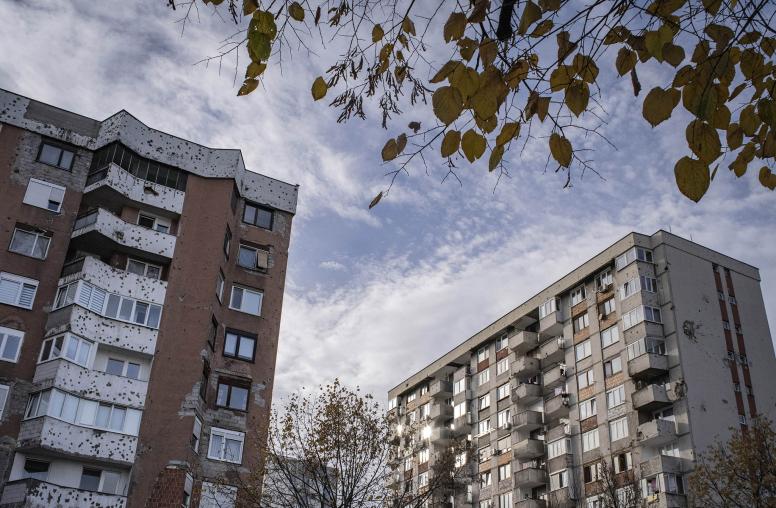Nearly 80 percent of the global population today experiences persecution and discrimination on the basis of their religion, belief, or non-belief. According to the Pew Research Center, there has been a worldwide uptick in religious persecution in recent years. In the face of this challenge to religious liberty, U.S. Secretary of State Michael Pompeo last week hosted the first-ever Ministerial to Advance Religious Freedom, which mobilized and engaged government and non-government actors working in this space. As an issue on which USIP has been engaged for decades—including advising on the passage and implementation of the 1998 International Religious Freedom Act—the Institute works to promote inclusive religious freedom as an important component of peace.

The Ministerial, which brought together foreign dignitaries from over 80 countries along with hundreds of religious leaders and civil society representatives, was convened by the Trump administration to explore and develop specific, actionable outcomes to halt the escalation of religious persecution and discrimination worldwide and bolster international cooperation to protect religious freedom for people of all faiths and none.
Protecting Religious Minorities
At a side event convened by USIP in partnership with the International Republican Institute and Search for Common Ground, USIP President Nancy Lindborg said, “We know from conviction and experience that religious freedom is a vital component of true, sustained peace.” For nearly three decades, USIP has supported religious peacebuilders who work courageously to advocate for the political and social inclusion of those from all faiths, including in places like Iraq, Nigeria, Burma, Sudan, Sri Lanka, and Pakistan.
Survivors of religious persecution shared their stories at the Ministerial, including members of the Baha’i, Yazidi, Christian, Uighur Muslim, and Tibetan Buddhist communities. Breakout sessions focused on the threat to religious freedom posed by violent extremist groups, who often target people of faith who do not ascribe to their own religious vision, as well as the intersection of women’s rights and religious freedom.
We know from conviction and experience that religious freedom is a vital component of true, sustained peace.
The Potomac Declaration, released at the close of the Ministerial, highlights components of the right to religious freedom as defined in Article 18 of the Universal Declaration of Human Rights and acknowledges the tremendous, tireless efforts of peace-waging religious actors worldwide, noting, “People of faith play an invaluable role in our communities. Faith and conscience motivates people to promote peace, tolerance, and justice …” Indeed, a central theme was the importance of partnerships with faith actors and organizations to advance religious freedom specifically and peace more broadly.
Outlined in practical details, the Potomac Plan of Action calls on participants—including foreign governments, religious actors, and civil society representatives—to take concrete steps to realize religious freedom for all people. Specifically, it calls for governments to defend the freedom of religion or belief, to “confront legal limitations” by promoting religious freedom in their laws to human rights standards, advocate for equal rights and protections for all people including religious minorities, respond to genocide and other mass atrocities, preserve cultural heritage, and strengthen government responses by training and equipping diplomats, religious actors, and civil society with the tools to advance religious freedom and pluralism.
This is important but not easy work. At the Friday event at USIP, distinguished panelists like Sheikh Abdullah bin Bayyah, His Holiness the Karmapa, Sadhvi Bagawati Saraswati, and Cardinal Onaiyekan explored religious engagement in efforts to counter violent extremism. Efforts to counter violent extremism have sometimes led to restrictions on religious freedom as governments exert greater control over religious spaces and speech. This can have a counterproductive effect, fueling resentment and anti-state violence.
Religious Freedom: A U.S. Foreign Policy Priority
As a tactic to advance religious freedom, interfaith peacebuilding not only reduces social prejudice and hostility, but also can create diverse coalitions to promote inclusive state policies and practices. To that end, Cardinal Onaiyekan reminded the audience that religious freedom promotion must take an inclusive lens, arguing that women, youth and people of all backgrounds must be equally granted the freedom to articulate their religious beliefs and practices in line with their conscience. Indeed, as noted by USIP’s Rev. Susan Hayward, freedom of religion can help ensure that women within faith communities who may articulate unorthodox theological viewpoints to defend their agency and leadership in peacebuilding can do so without fear of persecution. In this way, freedom of religion can advance societal inclusion more broadly.
At the conclusion of the Ministerial, Secretary Pompeo noted that this would become an annual gathering in Washington, D.C, with similar events convened throughout the world. These regular gatherings, accompanied by the creation of programs such as the International Religious Freedom Fund and the Genocide Recovery and Persecution Response Program, demonstrate that religious freedom is, and will continue to be, a top foreign policy priority of the Trump administration. As Vice President Pence noted, “… the United States of America stands for religious freedom yesterday, today, and always. We do this because it is right. But we also do this because religious freedom is in the interest of the peace and security of the world.”




